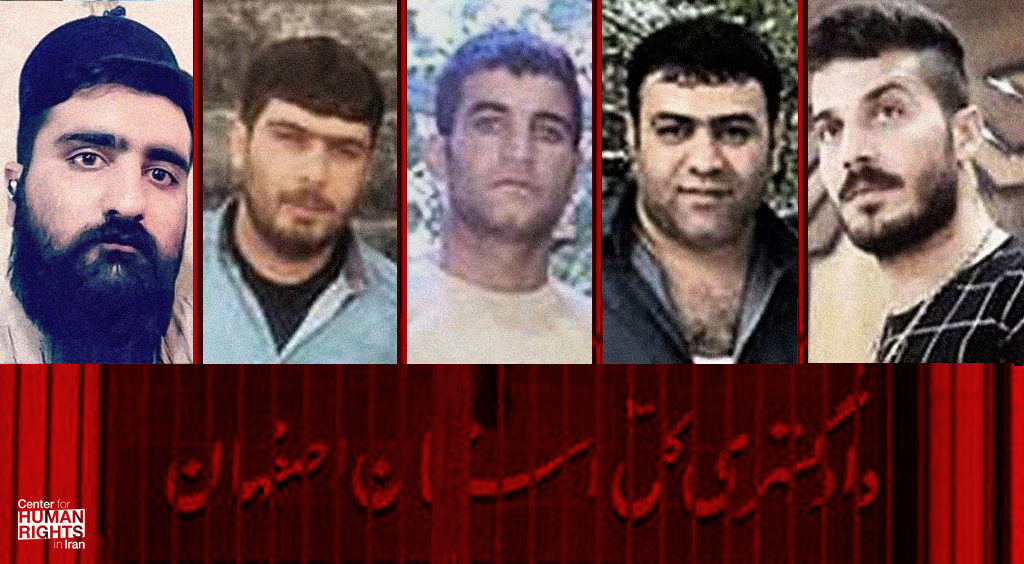Death Sentences for Five Men Upheld Despite Allegations of Torture, False Confessions
Evidence Contradicting Guilt Ignored in Effort to Cover Up Security Forces’ Culpability
July 31, 2020—Death sentences against five men arrested in Isfahan Province, central Iran, in connection with nationwide protests during December 2017-January 2018, have been upheld by the Supreme Court, a source with knowledge about the case told the Center for Human Rights in Iran (CHRI) on July 30, 2020, despite reports of false confessions extracted under torture and serious evidence contradicting the men’s guilt.
CHRI calls upon the authorities in Iran not to carry out these executions so that critical questions regarding the prosecutions can be investigated, and urges the international community to immediately and forcefully demand a stay in the executions.
“Executions are increasingly being used in Iran to quash dissent and intimidate the people into silence,” said Hadi Ghaemi, CHRI executive director. “Without evidence of guilt or due process, these executions are effectively state murder with impunity.”
The death sentences were issued for Mehdi Salehi Ghaleh-Shahrokhi, Mohammad Bastami, Abbas Mohammadi, Majid Nazari and Hadi Kiani.
Confusion and Fear Regarding Whether the Executions Are Imminent
In response to reports that their execution may be imminent, on July 25, 2020, the judiciary’s branch in Isfahan had announced: “So far no confirmation has been received from higher judicial authorities regarding the enforcement of any ruling in this case.”
An informed source who spoke to CHRI on condition of anonymity said that while the sentences were upheld, the families were informed that the cases are being considered by the judiciary’s Pardons and Amnesty Commission.
Video clips shared on social media on July 29, 2020, show relatives of the five men gathering in front of the judiciary in Isfahan.
“To keep their families quiet, the authorities have promised they will be pardoned on the occasion of Eid-e Qorban (July 31, 2020),” said the source. “But the families were worried that they might carry out the executions in secret. That’s why they held a gathering.”
Families Pressured Not to Speak to Media
The source continued: “The families have been put under pressure not to share any information or speak to the media. The families have kept quiet all this time because they were promised their children would be pardoned. They were told the Supreme Court would reverse the convictions. But the Supreme Court upheld them.”
According to the source, the five men were not arrested during the actual protests that gripped the country over economic hardships and political repression in late December 2017 and January 2018.
The source stated: “They were arrested in [the Iranian month of] Bahman [January 20-February 18, 2018], not during the protests. One night at midnight, 14 people were arrested during a raid in the Jouyabad neighborhood of Khomeini Shahr in Isfahan. Their families were in the dark for 40 days. They didn’t know where they had been taken. Then they found out they were being held by the Islamic Revolutionary Guard Corps (IRGC) Intelligence Organization.”
“Confessions” Extracted Under Torture, Evidence Contradicts Guilt
The source added: “All of them were put under the worst kinds of torture to make them confess to lies. In court, they told the judge they were tortured to say they burned Qurans and caused anarchy and killed people.”
CHRI has also learned that the lawyers for all the men were appointed by the court.
In January 2018, at least 22 people were reported killed by security forces during protests that took place throughout the country. One of the victims in Khomeini Shahr was Asghar Harounalrashidi.
“His family lodged complaints against the IRGC and the Basij militia who then blamed the death on these five people. Harounalrashidi was at the protests and was shot in the back. There are lots of video clips and photos showing the security forces shooting at the protesters but they blamed it on these five people without any evidence or video proof. They accused them of forming a group.
“We don’t know why they picked on these particular five people. The regime needed to intimidate the people so it picked them and sentenced them to death to scare the people. If they have really committed a crime, hold an open trial and present the evidence.”
Regarding the burning of Qurans, the source said: “Apparently during the January [2018] protests, a building was set on fire [which] burned everything inside. They say the Qurans got burned but they have not presented any evidence. One of the defendants, Abbas Mohammadi, was not even in Khomeini Shahr when the protests took place. He was on vacation.”
Five Sentenced to Death, Nine to Prison Terms
“[Of the 14 men who were arrested], the Revolutionary Court in Isfahan sentenced nine of them to prison terms of five to six years each and for the five others issued two death sentences for moharebeh and baghy.”
Under Iran’s Islamic Penal Code, moharebeh is “drawing a weapon on the life, property or chastity of people or to cause terror as it creates the atmosphere of insecurity” (Article 279) and baghy is extensive “felony against the bodily entity of people, offenses against internal or international security of the state, spreading lies, disruption of the economic system of the state…” (Article 286).
Both carry the death sentence.
Iranians Express Outrage against Executions on Social Media
Iranians have reacted with outrage to the growing number of political executions in Iran.
In July 2020, they began using the social media hashtag #Don’t_Execute in Persian to condemn the death sentences of three young men who were involved in the November 2019 protests. The hashtag has since become viral (with the UN also condemning the death sentences) and has now included references to the five men currently in grave danger of execution.







